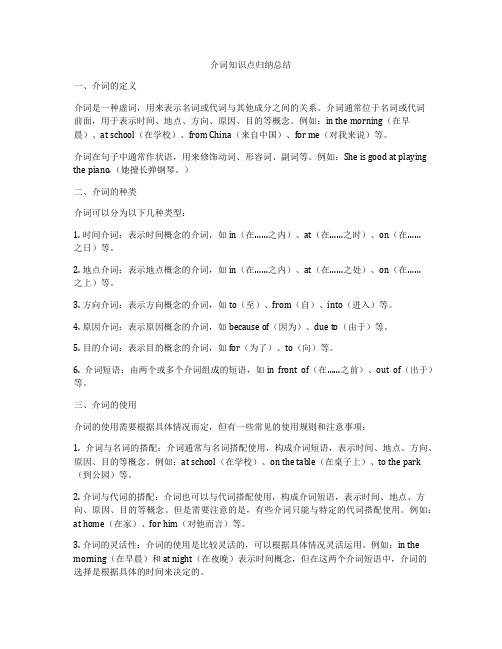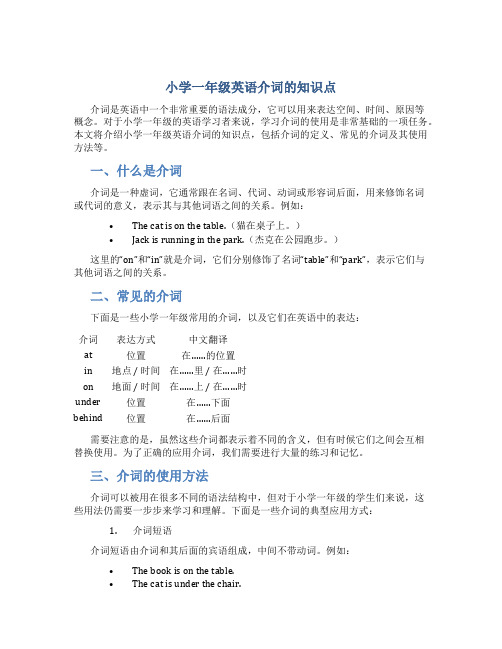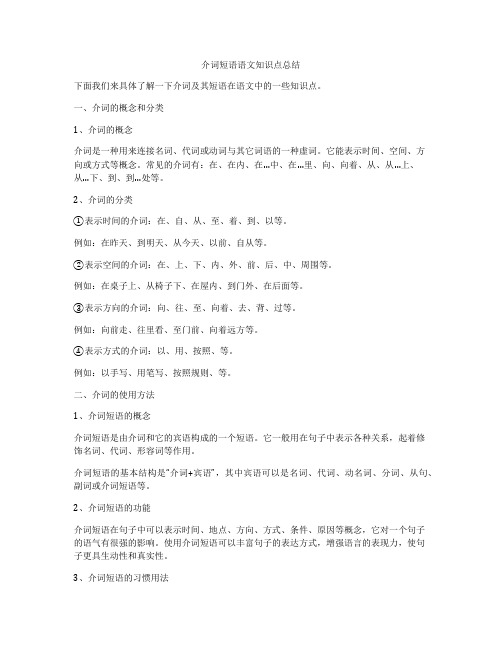介词和介词短语(知识梳理)
高职院校单独招生考试英语复习指导通用版第一部分基础知识梳理专题五介词和介词短语

考点一 常见介词的用法
1.in的常见用法
(3)“in+时间段”表示“在一段时间之后”,用于一般将来时。例如: He will arrive in Beijing in 3 days. 他将在3天后到达北京。 (4)表示方式、方法,意为“用……”,如语言、墨水、颜色、颜料等。例如: Can you speak in Chinese? 你能用汉语说吗? I am writing in blue ink.我正在用蓝墨水写字。 The little girl always talks in a low voice. 那个小女孩总是小声说话。 (5)表示方向。例如: The sun rises in the east. 太阳从东边升起。 (6)意为“处于……之中”,表示状态或情况等。例如: Jack is ill in bed now. 杰克正卧病在床。 My mother usually puts everything in good order. 我妈妈总是把东西放得井然有序。
考点一 常见介词的用法
4.for的常见用法
(7)用于句型“It is+adj.+for sb.to do sth.”,意为“对某人来说
做某事是……的”。若形容词表示一 个人的品德、品质等个性特征时
,应用句型“It is+adj.+of sb.to do sth.”。例如:
It’s difficult for me to finish the work.对我来说,完成这项工作 太难了。
考点一 常见介词的用法
5.by的常见用法
(5)意为“最迟在;在……以前”,表示时间。 ① “by+现在的时间点”用于一般现在时或现在完成时。例如: I have finished all my work by now. 到现在为止,我已经完成了全部工作。 ② “by+将来的时间点”用于一般将来时。例如: I will be there by 5o’clock. 我最迟5点到那里。 We will learn 2,000 words by the end of this term.到这学期期末,我们将学会2000个单 词。 ③ “by+过去的时间点”用于过去完成时,表“到……时候为止”。例如: By the end of last term,we had learned English for five years.到上学期期末为止,我们学 英语已有5年了。
2023届高考英语二轮专题复习专题四:介词与介词短语

at happy,pleased,angry,delighted等)连用, He was surprised at the news.
表示产生这种情感的原因
with
常与表示喜、怒、哀、乐等的抽象名词连用 ,强调随着心理变化而产生的情感变化
He
shouted
loudly
with
anger.
from 常接抽象名词,表示自然或间接原因
to 表示两地的相对位置,不接壤 Guangdong is on the east of
in
其后一般接大地方或表示在某个 Guangxi; Fujian lies to the south of
范围之内
Jiangsu and all of them are in China.
off
表示"(时空上)离,距"
3.before, by, until(till)
介词
用法
例句
before 表示"在……之前",与after相对 Please come before ten o'clock.
by 表示"不迟于,在……之前"
I'll have it done by tomorrow.
until (till)
表示"直到……为止",在肯定句 You must wait until/till tomorrow.I
高三语法总复习
专题四 介词和介词短语
By Tiffany
目录
CONTENTS
考点1 介 词 考点2 介词短语及搭配 难点 同一介词所表达的多种含义
考点1 介词
知识1 表示"时间"的介词
介词知识点归纳总结

介词知识点归纳总结一、介词的定义介词是一种虚词,用来表示名词或代词与其他成分之间的关系。
介词通常位于名词或代词前面,用于表示时间、地点、方向、原因、目的等概念。
例如:in the morning(在早晨)、at school(在学校)、from China(来自中国)、for me(对我来说)等。
介词在句子中通常作状语,用来修饰动词、形容词、副词等。
例如:She is good at playing the piano.(她擅长弹钢琴。
)二、介词的种类介词可以分为以下几种类型:1. 时间介词:表示时间概念的介词,如in(在……之内)、at(在……之时)、on(在……之日)等。
2. 地点介词:表示地点概念的介词,如in(在……之内)、at(在……之处)、on(在……之上)等。
3. 方向介词:表示方向概念的介词,如to(至)、from(自)、into(进入)等。
4. 原因介词:表示原因概念的介词,如because of(因为)、due to(由于)等。
5. 目的介词:表示目的概念的介词,如for(为了)、to(向)等。
6. 介词短语:由两个或多个介词组成的短语,如in front of(在……之前)、out of(出于)等。
三、介词的使用介词的使用需要根据具体情况而定,但有一些常见的使用规则和注意事项:1. 介词与名词的搭配:介词通常与名词搭配使用,构成介词短语,表示时间、地点、方向、原因、目的等概念。
例如:at school(在学校)、on the table(在桌子上)、to the park (到公园)等。
2. 介词与代词的搭配:介词也可以与代词搭配使用,构成介词短语,表示时间、地点、方向、原因、目的等概念。
但是需要注意的是,有些介词只能与特定的代词搭配使用。
例如:at home(在家)、for him(对他而言)等。
3. 介词的灵活性:介词的使用是比较灵活的,可以根据具体情况灵活运用。
例如:in the morning(在早晨)和at night(在夜晚)表示时间概念,但在这两个介词短语中,介词的选择是根据具体的时间来决定的。
小学一年级英语介词的知识点

小学一年级英语介词的知识点介词是英语中一个非常重要的语法成分,它可以用来表达空间、时间、原因等概念。
对于小学一年级的英语学习者来说,学习介词的使用是非常基础的一项任务。
本文将介绍小学一年级英语介词的知识点,包括介词的定义、常见的介词及其使用方法等。
一、什么是介词介词是一种虚词,它通常跟在名词、代词、动词或形容词后面,用来修饰名词或代词的意义,表示其与其他词语之间的关系。
例如:•The cat is on the table.(猫在桌子上。
)•Jack is running in the park.(杰克在公园跑步。
)这里的“on”和“in”就是介词,它们分别修饰了名词“table”和“park”,表示它们与其他词语之间的关系。
二、常见的介词下面是一些小学一年级常用的介词,以及它们在英语中的表达:介词表达方式中文翻译at 位置在……的位置in 地点 / 时间在……里 / 在……时on 地面 / 时间在……上 / 在……时under 位置在……下面behind 位置在……后面需要注意的是,虽然这些介词都表示着不同的含义,但有时候它们之间会互相替换使用。
为了正确的应用介词,我们需要进行大量的练习和记忆。
三、介词的使用方法介词可以被用在很多不同的语法结构中,但对于小学一年级的学生们来说,这些用法仍需要一步步来学习和理解。
下面是一些介词的典型应用方式:1.介词短语介词短语由介词和其后面的宾语组成,中间不带动词。
例如:•The book is on the table.•The cat is under the chair.2.时间介词时间介词表示某个动作或事件发生的时间,可以用来回答“什么时候”的问题。
例如:•I usually go to bed at 10 o’clock.•We have English class on Monday.3.地点介词地点介词用来描述某个事物或人所处的位置,可以用来回答“在哪里”的问题。
介词短语语文知识点总结

介词短语语文知识点总结下面我们来具体了解一下介词及其短语在语文中的一些知识点。
一、介词的概念和分类1、介词的概念介词是一种用来连接名词、代词或动词与其它词语的一种虚词。
它能表示时间、空间、方向或方式等概念。
常见的介词有:在、在内、在…中、在…里、向、向着、从、从…上、从…下、到、到…处等。
2、介词的分类①表示时间的介词:在、自、从、至、着、到、以等。
例如:在昨天、到明天、从今天、以前、自从等。
②表示空间的介词:在、上、下、内、外、前、后、中、周围等。
例如:在桌子上、从椅子下、在屋内、到门外、在后面等。
③表示方向的介词:向、往、至、向着、去、背、过等。
例如:向前走、往里看、至门前、向着远方等。
④表示方式的介词:以、用、按照、等。
例如:以手写、用笔写、按照规则、等。
二、介词的使用方法1、介词短语的概念介词短语是由介词和它的宾语构成的一个短语。
它一般用在句子中表示各种关系,起着修饰名词、代词、形容词等作用。
介词短语的基本结构是“介词+宾语”,其中宾语可以是名词、代词、动名词、分词、从句、副词或介词短语等。
2、介词短语的功能介词短语在句子中可以表示时间、地点、方向、方式、条件、原因等概念,它对一个句子的语气有很强的影响。
使用介词短语可以丰富句子的表达方式,增强语言的表现力,使句子更具生动性和真实性。
3、介词短语的习惯用法介词短语的使用有一些习惯用法,这些习惯用法是我们理解介词短语的重要依据。
例如:in front of(在…前面)、on the left(在…左边)、at the back of(在…后面)、up to(直至)、from…to(从…到)、beside(在…旁边)、across from(在…对面)等。
三、介词短语的构成和功能1、介词短语的构成介词短语是由介词和它的宾语构成的一个短语。
宾语可以是名词、代词、动名词、分词、从句、副词或介词短语等。
例如:in the classroom(在教室里)、through the window (透过窗户)、toward the north(朝北方)、by the way(顺便说一下)等。
人教版六年级上册知识点归纳介词的常见用法和搭配整理

人教版六年级上册知识点归纳介词的常见用法和搭配整理介词是一种虚词,它通常位于名词、代词或动词后面,用来表示名词、代词或动词与其他句子成分之间的关系。
在人教版六年级上册中,我们学习了许多常见的介词及其用法和搭配。
下面对这些知识进行归纳整理。
1. in介词in表示在某个地方或某个范围内。
用法:(1) 表示地点:in the classroom(在教室里)、in the park(在公园里);(2) 表示时间:in the morning(在早晨)、in winter(在冬天);(3) 表示状态:in bed(在床上)、in trouble(遇到麻烦)。
2. at介词at表示在特定的地点或时间。
用法:(1) 表示地点:at school(在学校)、at home(在家);(2) 表示时间:at 8 o'clock(在8点钟)、at night(在晚上);(3) 表示事件:at the party(在聚会上)、at the cinema(在电影院)。
3. on介词on表示在某个表面或某个日期。
用法:(1) 表示表面:on the desk(在桌子上)、on the floor(在地板上);(2) 表示日期:on Monday(在星期一)、on New Year's Day(在元旦);(3) 表示交通工具:on the bus(在公交车上)、on a plane(坐飞机)。
4. under介词under表示在某物的下方或某人的控制之下。
用法:(1) 表示位置:under the bed(床底下)、under the tree(在树下);(2) 表示控制:under your parents' guidance(在你父母的指导下)、under the teacher's supervision(在老师的监督下)。
5. in front of介词短语in front of表示在某物的前面。
中考英语介词的用法讲解
中考英语介词的用法讲解一、知识框架二、知识点梳理一、定义:介词:是一种用来表示词与词、词与句之间的关系的词,在句中不能单独作句子成分。
二、介词短语的句法作用1、介词短语相当于一个形容词或副词,可用作状语、定语和表语。
如:The man came <down the stairs>.(状)The woman <with a flower on her head> is from the countryside.(定)The teacher is now with the pupils.(表)(老师现在和学生在一起)2、介词短语在句子中的位置:介词短语做状语时,如果表示时间/地点,可以放在句首或句尾。
如果表示方向/方式/伴随/涉及/原因/目的/比较,一般放在句尾;介词短语作表语时放在连系动词之后;介词短语作定语时,只能放在被修饰的名词之后。
如:He wanted to find a good job in Shanghai the next year.(状语)They searched the room for the thief.The letters are for you.(表语)Have you seen a cat with a black head and four white legs?(定语)三、介词用法(一)表时间的介词:1.at通常用于:(表示在某个时刻或者瞬间)at+时间点,节日(泛指圣诞节、新年等整个假期时,要用at)如:at 7:30; at lunch time; at Christmas 在圣诞节期间固定词组搭配:at dawn, at night, at midnight, at noon, at that time, at the moment2. on通常用于:(表示在具体的某一天或者某天的上下午等)on+具体时间(日期,星期几)on October 1st ; on Monday; on a rainy morning; on Teachers’ Dayon Christmas Day 在圣诞节这一天3. in通常用于:(表示在一段时间里)①in+世纪/年/月/季节/早/中/晚in the 20th century, in the late 18th century②特定的年龄段,in his thirties (在他30多岁时)补充1:表示“在一段时间之后”,句子常用一般将来时。
介词与介词短语英语知识点总结
介词与介词短语英语知识点总结介词是一种用来表示名词与其他词或短语之间关系的词类。
常见的介词有in, on, at, for, with等。
1. 位置关系:- 在某位置:in, on, atin表示在物体或空间内部,on表示在物体表面,at表示在具体位置或某地。
例句:He is in the room. She is sitting on the chair. They are waiting at the bus stop.- 离开某位置:from, off, out offrom表示离开某一具体位置,off表示从某一表面离开,out of表示从某一空间或物体内部离开。
例句:He is coming from the airport. The cat jumped off the table. She took her phone out of her bag.2. 时间关系:- 表示具体时间:in, on, atin表示在某一段时间内,on表示在某一具体日期或星期,at 表示在某一具体时间。
例句:We will have a meeting in the afternoon. I will see him on Monday. The movie starts at 7 o'clock.- 表示时间段:during, forduring表示在某一整个时间段内,for表示在某一时间段的持续时间。
例句:He slept during the night. I will stay here for a week.3. 关系连接:- 表示原因:because of, due tobecause of表示由于,due to表示由于(正式用语)。
例句:He couldn't come because of the rain. The event was canceled due to bad weather.- 表示目的:for, tofor表示为了某一目的,to表示向某一目的地或对象。
介词及短语知识点总结
介词短语聚焦1.in+语言/颜色/衣帽等,表示使用某种语言或穿着..... 。
如:in English, m the hat2.in + Row/ Teaiir' Class/ Grade 等,表示''在 ..... 排/队/班级/年级”等。
3.m the morning/ afternoon/ evening.1表示"在上午/下午/傍晚”等一段时间。
4.m the desk/ pencil-box/bedioom等表示"在书桌/铅笔盒/卧室里”。
5.in the tree表示“在树上(非树本身所有)”;on the tiee表示“在树上(为树本身所有)”。
如:There ai e some in the tiee・ There are many apples on the trees・6.in the wall表示“在墙上(凹陷进去)”;oil the wall表示"在墙上(指墙的表面)”。
女口:There' re four windows ill the wall, and there is a map on the back wall.7.at work (在工作)/at school (上学)/at home (在家)应注意此类短语中无the。
8.at + 时刻表示钟点。
如:at six, at half, past ten.9.like this/that表示方式,意为“像……这/那样”。
10・ of 短语表示所属关系。
女山a picture of a classroom, a map of China.11・ behind/ beside/ near/ under+ 名词等,表示方位、处所。
如:beside/ near the door, under/ behmd the tree・12. from与to多表示方向,前者意为''从...... ”,后者意为"到.... ”。
语文介词结构知识点总结
语文介词结构知识点总结介词是表示时间、地点、方向、原因、目的、手段等概念的一类词语,它通常与名词、代词、动词、形容词等词语搭配使用,构成介词短语或介词结构。
介词结构在语言中具有重要的地位,它能够丰富语言表达方式,丰富句子结构,使句子更加丰富多样,更贴切地表达说话者的内心意思。
一、介词的定义和分类1. 介词是表示方位、时间、原因、目的等概念的一类词语,它通常用于构成介词短语或介词结构,起到修饰名词、代词、动词、形容词等作用。
2. 介词按照使用的对象可以分为时间介词、地点介词、原因介词、目的介词等不同类别。
例如:at, in, on, to, for, of等。
二、介词短语1. 介词短语是由介词和其它词语构成的短语结构,它通常用于修饰名词或代词,表示时间、地点、方向、原因、目的等概念。
例如:in the park, on the table, at 7:00, to the library等。
2. 介词短语在句子中通常起到定语、状语或补语的作用,用于修饰名词、代词、动词等。
三、介词结构1. 介词结构是由介词、宾语和宾语的修饰语构成的结构,它通常用于修饰动词、形容词、名词等,表示动作的方式、原因、目的等概念。
例如:listen to music, look at the sky, be interested in English等。
2. 介词结构在句子中通常起到状语、宾语、定语等作用,用于修饰动词、形容词、名词等。
四、介词短语与介词结构的区别1. 介词短语是由介词和其它词语构成的短语结构,用于修饰名词或代词,表示时间、地点、方向、原因、目的等概念。
介词短语在句子中通常起到定语、状语或补语的作用。
2. 介词结构是由介词、宾语和宾语的修饰语构成的结构,用于修饰动词、形容词、名词等,表示动作的方式、原因、目的等概念。
介词结构在句子中通常起到状语、宾语、定语等作用。
五、介词短语和介词结构的应用1. 在句子中,介词短语和介词结构常常起到修饰名词、代词、动词、形容词等的作用,丰富了句子的结构,使句子更加丰富多样,更贴切地表达说话者的内心意思。
- 1、下载文档前请自行甄别文档内容的完整性,平台不提供额外的编辑、内容补充、找答案等附加服务。
- 2、"仅部分预览"的文档,不可在线预览部分如存在完整性等问题,可反馈申请退款(可完整预览的文档不适用该条件!)。
- 3、如文档侵犯您的权益,请联系客服反馈,我们会尽快为您处理(人工客服工作时间:9:00-18:30)。
介词和介词短语(知识梳理)真题再现:1. 〔They believe that there are transport developments ______ that will bring a lot of changes for the better.A. out of dateB. out of orderC. around the clockD. around the corner2. Last year was the warmest year on record, with global temperature 0.68 ℃____ the average.A. belowB. onC. atD. above3. Have you ever heard of the trees that are homes _________ anim als both on land and sea?A. aboutB. toC. withD. over4. Most people work because it’s unavoidable. , there are some people who actually enjoy work.A. As a resultB. In additionC. By contrastD. In conclusion5. These comments came specific questions often asked b y local newsmen.A. in memory ofB. in response toC. in touch withD. in possession of6. Many of the things we now benefit from would not be around __ ______ Thomas Edison.A. thanks toB. regardless ofC. aside fromD. but for7. This meeting room is a non-smoking area. I would like to warn y ou _______ that if you smoked here you would be fined.A. in advanceB. in detailC. in totalD. in general8. Human life is regarded as part of nature and, as such, the only w ay for us to survive is to live ____nature.A. in view ofB. in need ofC. in touch withD. in harmony with9. The little pupil took his grandma the arm and walked her across the street.A. onB. byC. inD. at110. A common memory they all have___________ their school days is the school uniform.A. ofB. onC. toD. with答案与解析:1.解析: D。
此题考查的是介词短语,A选项过时的,B选项无秩序,C 选项夜以继日地,D选项即将到来。
根据语意, 应选:D2. 解析:D。
此题考查的知识点是介词。
on record 有记载的,below the average平均水平以下,above the average平均水平以上,on the avera ge平均来说。
故D正确。
3. 解析:B。
句意:你是否有听说过树是陆上动物和海上动物的家?h ome to sth. 固定搭配,〝是什么的家园〞的意思。
该句是一个疑问句,其中还含有一个定语从句。
4. 解析:C。
句意:很多人工作是因为这是不可避免的,相反,有一些人是的确喜欢工作的。
根据前后的意思,可以知道前后是表示对比。
A 意为〝结果〞,B意为〝此外〞,C意为〝相反〞,D意为〝结论〞。
〝不可避免〞表述到一种无奈,也就是说,很多人是不得不工作的。
后句的表达是〝事实上有些人喜欢工作〞,〝喜欢〞和〝不得不〞刚好构成一种否定,所以答案只能是选C。
5. 解析:B。
句意:这些评论是对某些经常被当地记者问到的问题的回应。
in memory of意为〝纪念〞,in response to意为〝回应〞,in touc h with意为〝联系〞,in possession of意为〝拥有〞。
分析句子成分知道空格处充当介词短语作状语的作用,根据常识和句意,评论应该是对问题的回应。
6. 解析:D。
此题考察虚拟语气but for的用法,句意为:如果没有T homas,对我们有益处的很多东西就不会来到我们身边。
7. 解析:A。
考查介词短语辨析。
句意:这个会议室是非吸烟区。
我要提前提醒你,如果你在这里吸烟,你会被罚款的。
8. 解析:D。
in view of在……眼里;in need of需要;in touch with 和……接触;in harmony with与……和谐相处。
这四个短语后面都应该接名词,该句意思为:人的生活是自然的一部分,因此,我们生存下来的唯一的方法就是与自然和谐相处。
根据句意,应选D。
9. 解析:B。
句意:这个小学生拉住他奶奶的膀子和她一起穿过街道。
take sb. by the arm拉住某人的膀子,所以选B。
10. 解析:A。
of关于,表示从属关系;on在……之上;to对于;wit h和……在一起。
该句意思为:他们共有的关于他们学校的记忆是校服。
应选A。
难点是介词放在定语从句部分考查。
语法讲解:介词主要考查近义词的用法区别、介词的特定含义、介词和连词易混淆的项目、介词的固定用法等。
在历年全国各地高考试题中,都涉及到介词的考查,不仅在单项填空中进行考查,在短文改错题中,对于介词的有无、介词与其他词的固定搭配的考查尤为频繁。
介词是英语中比较活跃的词,中学阶段所学的介词有40多个。
它与名词、形容词、副词和动词等构成搭配时用法灵活,意义丰富。
搭配比较活跃的介词主要有in,out,up,down,on,off,to,from,for,over,with等。
介词的考查将以介词的固定短语和介词辨析为主。
介词的定义及分类介词又叫前置词,属于虚词,后面必须接名词、代词或相当于名词或代词的词、短语、句子作宾语。
介词本身数量不大,但它与动词、形容词和名词等实词的搭配力极强。
介词可按其构成分为:简单介词,即一个介词,如about,at,in,of,since等。
复合介词,由两个介词组成,如as for,as to,out of等。
二重介词,由两个介词搭配而成,但没有复合介词那样固定,如fro m under,from behind,until after,except in等。
短语介词,由短语构成,如according to,because of,in spite of,on behalf of,with reference to等。
分词介词,由现在分词构成,如regarding,concerning,including等。
〝动词+介词〞短语举例:look after sb/sth 照顾,看管look at sb/sth 注视,着眼于look for sb/sth 寻找;期待,期望look forward to sth/doing sth 盼望,期待look into sth 窥视;调查;浏览look like sb/sth 看起来像look up sth查阅〝形容词+介词〞短语举例:be afraid of sth.害怕某事be curious about 对什么好奇be different from 与什么不同be interested in sth. /sb. 对某人或某物很感兴趣be proud of 骄傲,自豪be similar to 与……相似be strict with 对……严格要求〝名词+介词〞短语举例:attitude to/towards 态度,看法belief in sth./sb.相信某人或某事congratulation on sth 对…(表示)祝贺interest(n.)in sth 对…的兴趣respect(n.)for sb/sth.对…的尊敬satisfaction with sb/sth 对…满意〝介词+名词〞短语举例:at hand 在手边,在附近by accident 偶然beyond doubt 毫无疑问in addition 另外for the moment 现在,暂时from time to time 有时,不时with the purpose of 为了常见介词用法againstNobody has got anything against you at all. 〔反对〕He saw a girl sitting alone on a bench against the wall. 〔靠着〕We have saved some money against old age. 〔防备〕The little red house looks so beautiful against the green woods. 〔在……映衬下〕atThey left their luggage at the station. 〔at后接地点〕At noon there was still no news. 〔at后接时间〕What are you laughing at? 〔at后接原因〕I was surprised at his words.〔at强调引起某种情感的原因〕I came here at her invitation/request. 〔at表示〝应要求、请求等〞〕When I arrived, they were at their meal. 〔at固定搭配,吃饭〕I am rather slow at drawing. 〔at强调在某方面〕I won’t buy it at that price. 〔at后接价格〕beyondHe saw a house beyond the woods. 〔在……那边〕It was quite beyond me. 〔超出能力、范围等〕byHe left by the nearest exit.〔通过〕We traveled by sea/plane to save time. 〔表示手段、方式,无冠词〕By next Friday I will have finished the job. 〔到……为止〕He taught himself English by practicing all day long. 〔by doing表示手段、方式〕He took her by the hand. 〔by the 〝身体部位〞〕I did that by accident/mistake/nature. 〔固定搭配〕Sugar is sold by the pound/weight. 〔by the具体单位/重量、面积等〕He is older than Mike by five years. 〔表示差距〕The room is forty feet by twenty. 〔表示乘号〕withWho is that with brown hair? 〔表示伴随特征〕He was asleep with his head on his arms. 〔表示伴随动作〕Weather changes with the season.〔随着〕above1.表示位置、年龄、职位、数量:在……上面,在……之上above the sea level 海平面以上two degrees above zero零上二度2.表示品质、行为、能力等〝超出……之外〞The maths problem is above (beyond) me. 这个问题我解决不了。
